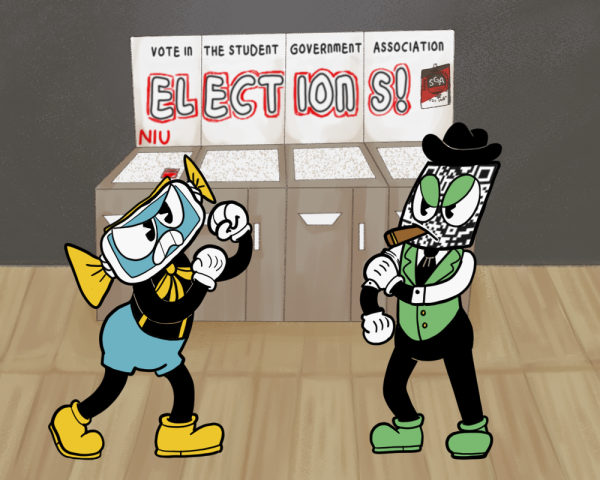Editorial: Title IX leaves more to be desired
In 1972, Title IX was enacted with a goal of operating federally-funded programs free of discrimination, but when there’s been examples of failures that after 50 years, you have to wonder if there’s been any significant changes. (Isaac Trusty | Northern Star)
Editor’s note: Joey Trella, opinion editor and NIU student-athlete, was not a part of writing this editorial.
It’s been 50 years since Title IX was enacted, and we’ve seen women athletes dominate in their sports and demonstrate that they’re equal to their male peers.
In 1972, federally funded schools and programs were told that they couldn’t discriminate based on gender and sexual orientation – 50 years, but have things really changed?
According to the Department of Education, Title IX states that “a recipient institution that receives Department funds must operate its education program or activity in a nondiscriminatory manner free of discrimination based on sex, including sexual orientation and gender identity,” which mandates ethical recruitment, treatment of LGBTQ+ students, financial assistance and more.
Over the recent years, we’ve seen neglect in women’s sports that can make people wonder if Title IX is working as intended in 2022.
You might remember in March 2021 when the National Collegiate Athletic Association basketball tournament, also called March Madness, was starting and women basketball players and sports commentators posted photos of their training conditions. The pictures showed the substandard quality difference between merch, equipment and food the women were given compared to the men.
After clips and photos went viral, the NCAA released a statement that didn’t go over very well as it seemingly tried to push the blame off itself.
The NCAA has been a part of the problem for roughly two decades. The Supreme Court ruling in NCAA v. Smith decided that the NCAA doesn’t have to abide by Title IX’s rules because it’s a non-profit member of collegiate institutions.
Sedona Prince, a women’s basketball player for the University of Oregon, when speaking out about the disparities in a TikTok video said, “if you aren’t upset about this problem, then you’re a part of it.”
Whenever a team makes it to a tournament like March Madness, that is already a huge accomplishment, but when women’s teams make it, it’s even more admirable considering they play in a male-dominated industry. Even though the field is male-dominated, Title IX was supposed to protect women athletes and make sure what happened during March Madness 2021 never happened.
Unfortunately, women’s college basketball isn’t the only sport that has been neglected. The U.S. women’s soccer team filed a complaint in 2016, claiming that their male peers were being paid four times more than them despite having won four World Cup titles compared to the men’s zero. An official lawsuit was filed in 2019.
It wasn’t until February of this year that a Los Angles federal judge granted the women’s soccer team a $24 million pay discrimination settlement. This caused the U.S. Soccer Federation to announce a history-breaking plan for equal pay between its men’s and women’s teams. This plan shouldn’t have been history-making in 2022, 50 years after Title IX and four championships later.
We even see these problems on our home turf. When looking at the NIU football and women’s volleyball teams, their attendance numbers for homecoming weekend say a lot. Volleyball has an overall record of 13-4 but only had roughly 560 attendees this weekend, while football had over 12,000 despite their record being 1-5 overall.
This is not to say that Title IX hasn’t seen success since its implementation in 1972. Any gender can join any team they want, become professionals and go on to win national championships titles, like the recently crowned Las Vegas Aces.
With success comes failure, but 50 years is too long for people to reasonably continue to focus only on the successes of Title IX.
It’s time we move the spotlight off men’s sports and onto women’s sports as women have proven time and time again they are capable of being on the same level as men and even outperforming them. Give women athletes the respect they’ve earned and deserve.

















